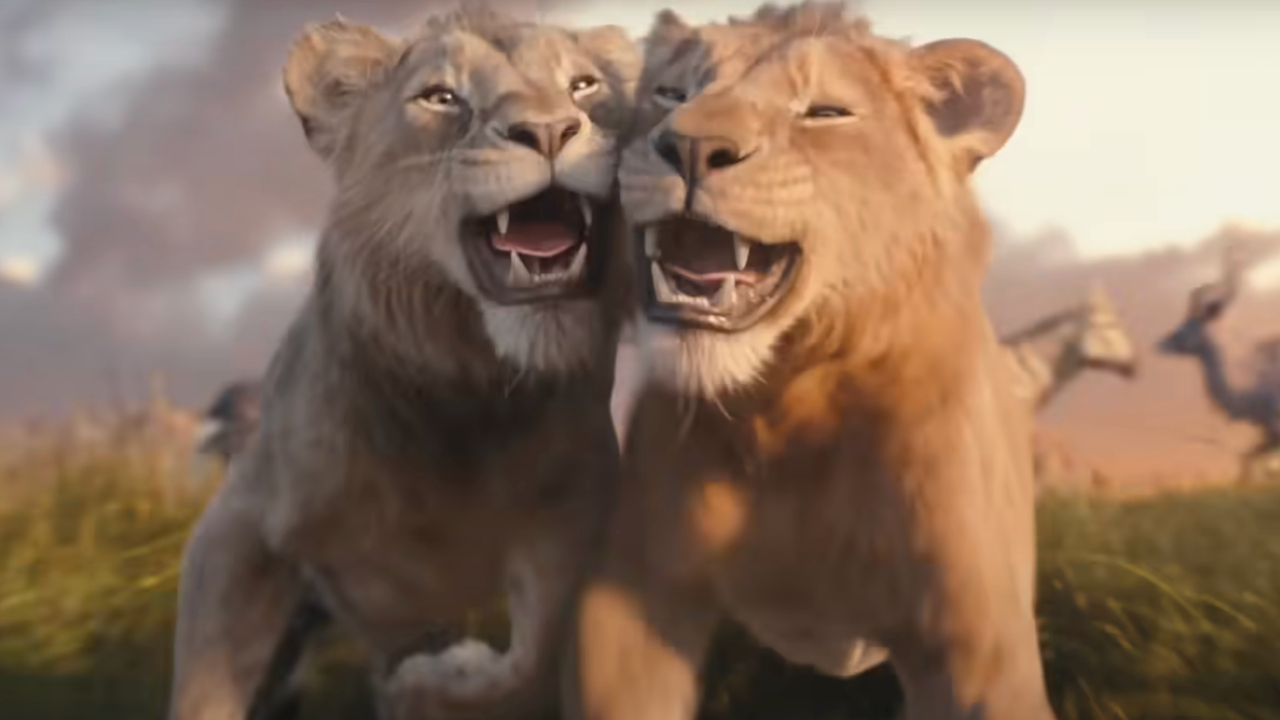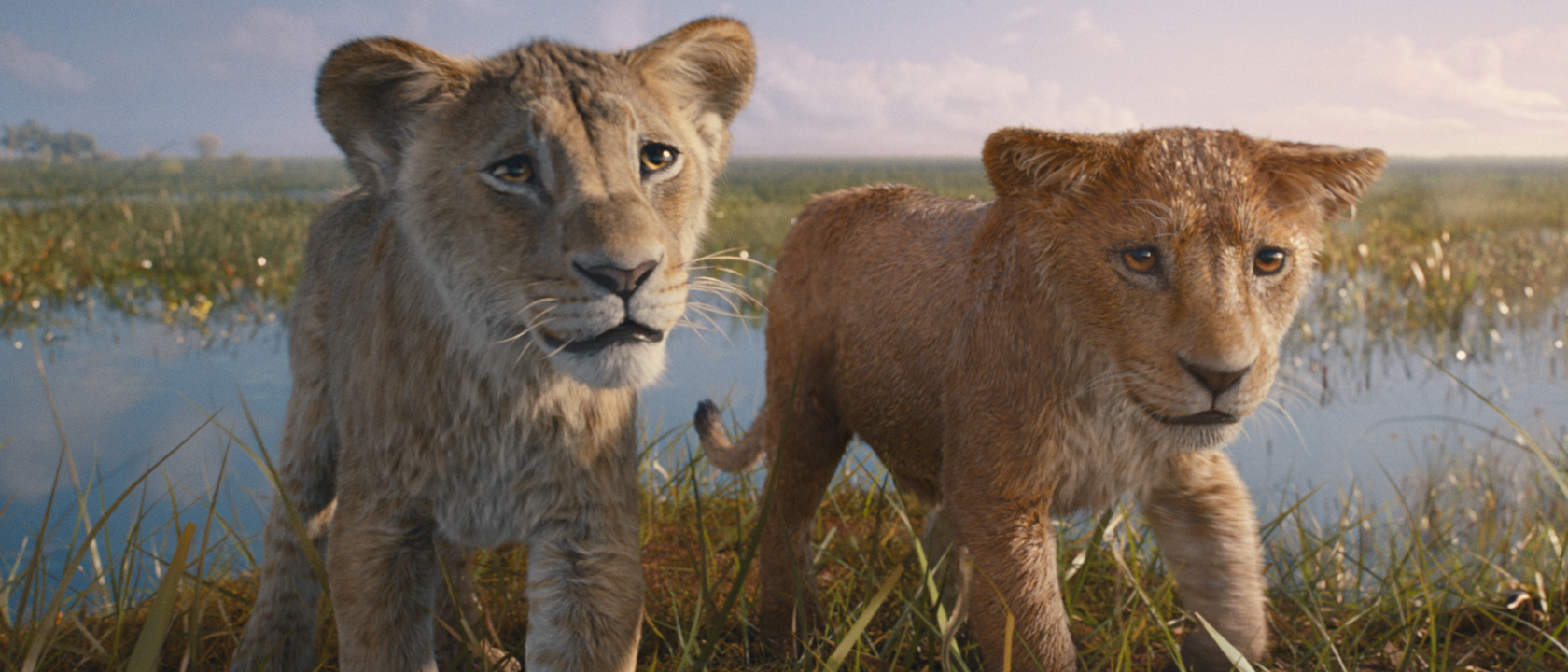Reviewing Mufasa: The Lion King less than one week after reviewing Kraven The Hunter is somewhat of an oddity – and it doesn’t have anything to do with the fact that both movies prominently feature CGI lions. In advance of seeing both features, the cynical part of my brain repeatedly highlighted the apparent shallowness in the two franchise titles from a Hollywood development standpoint, but I kept those thoughts at bay with reminders that the two films respectively had proven talents at the helm. Barry Jenkins and J.C. Chandor are both gifted directors who have earned all of the acclaim they have received, and I maintained hope both that the studios would respect the visions of the men they hired, and that their skills would ultimately provide raison d'être for projects lacking in it from an outside perspective.

Release Date: December 20, 2024
Directed By: Barry Jenkins
Written By: Jeff Nathanson
Starring: Aaron Pierre, Kelvin Harrison Jr., Mads Mikkelsen, Thandiwe Newton, and Lennie James
Rating: PG for action/violence, peril and some thematic elements
Runtime: 120 minutes
Mufasa: The Lion King: Release Date, Trailer, Cast, And Other Things We Know About The Live-Action Movie
It didn’t work out for Chandor with Kraven The Hunter, but Jenkins has fared marginally better with Mufasa: The Lion King. The CGI animals look a hell of a lot better than those in the comic book movie for starters, and there are splashes of interesting character development within the legitimate spectacle of the vast photorealistic digital landscapes. Unfortunately, those positive qualities are counterbalanced by the first act being a slog of story setup and the second and third acts falling into the ever-annoying prequel trap of answering in-canon questions that nobody has ever asked. There is some critical leeway to be given for its most overly familiar elements given the age of the main target demographic, but only so much as to recognize the film as passable.
Mufasa’s narrative framing device returns audiences to the Pride Rock of Jon Favreau’s 2019 remake of The Lion King and sees Kiara (Blue Ivy Carter), the daughter of Simba (Donald Glover) and Nala (Beyonce Knowles-Carter), left in the hands of Rafiki (John Kani), Timon (Billy Eichner) and Pumbaa (Seth Rogen) as her parents leave to take care of an undisclosed matter. With Kiara being scared of a coming rainstorm, her babysitters keep her distracted with the story of her legendary grandfather.
We learn that Mufasa (Aaron Pierre) was separated from his parents (Keith David, Anika Noni Rose) when he was a cub and was raised as a stray by another pride of lions. While he is scorned by King Obasi (Lennie James), he is accepted as a son by Queen Eshe (Thandiwe Newton) and as a brother by their cub Taka (Kelvin Harrison Jr.). Years after his arrival, he is given a massive responsibility when the cats learn about an approaching rival pride of white lions dubbed the Outsiders. Kiros (Mads Mikkelsen), their leader, wishes to rule over all, and Mufasa is told to escape with Taka so that he and the royal bloodline are protected.
Mufasa: The Lion King takes a long time to really get going.
It takes Mufasa: The Lion King 40 minutes to get through all of what I described above, and it’s a languorous 40 minutes. It gets off on the wrong foot by heavy-handedly working to echo its predecessor – from the opening that sees all varieties of animal species gather around Pride Rock to a dramatic zoom into a young Mufasa’s face (a la young Simba in the stampede) as he finds himself caught in the flash flood that washes him away from home – but what’s more significant is how laboriously it lays the groundwork for the main story.
Upon reflection, it’s actually strange just how little Mufasa pines for his parents after he gets lost (their fate is left open ended post-flood), and it makes the inciting incident of Mufasa: The Lion King into a cold A-to-B plot machination that moves the protagonist like a chess piece instead of launching an emotional arc. Things don’t improve with the B-to-C move either. A modicum of energy is found establishing that Obasi, a paranoid ruler over his pride, would rather eat the eponymous character than accept him in his community… but all of the heat from that dynamic disappears as the film executes a time jump that sees Mufasa and Taka grow from cubs into adults in an instant. (Credit where credit is due, it’s during what is the best of the movie’s Lin-Manuel Miranda-written musical sequences, “I Always Wanted A Brother”.)
It’s only when Mufasa and Taka flee together that the film finally feels like it has direction, as there are clear stakes (the Outsiders are close behind and want to kill them) and there is an established goal (getting to Milele, a mythological plain beyond the horizon that the protagonist learned about from his parents). Here, the movie also settles on its principal purpose, which is having the audience understand the relationship between the two brothers (it’s not a secret that Taka eventually becomes the villainous Scar from The Lion King) and exploring themes about the dangers of inherited power. Unfortunately, this journey is weighed down by also feeling the need to tie itself to the animated classic far beyond that as well.
Once it gets going, Mufasa: The Lion King gets too bogged down in prequel-centric material.
Did you ever wonder how Rafiki got his staff? Or how Pride Rock took shape? I never have, and I’m betting you haven’t either. And yet, Jeff Nathanson’s screenplay is written as though it is filling out a checklist of references to satiate fans hungry for that trivia. Paired with the aforementioned stylistic echoes from the first act, Mufasa: The Lion King holds itself back from feeling like an independent creation by being overly beholden to its predecessor/s.
More excusable within this particular context of the film is the way in which other principal characters from the 1994 classic/the 2019 remake are introduced, but there are still notable flaws. Rifiki is fleshed out and given some backstory when he enters the narrative (logical, given that he is the “storyteller”), but Sarabi (Tiffany Boone) and Zazu (Preston Nyman) simply pop up and decide to join Mufasa and Taka on their journey and are provided with no extra depth. Zazu at least has a personality that adds comedic relief to the film, but Sarabi is effectively a plot device; it’s a basic love triangle that ignites a rift between the brothers.
Visually, lessons have been learned from Jon Favreau's The Lion King.
Like Jon Favreau’s 2019 remake of The Lion King, Mufasa is another demonstration of just how far visual effects have come, but some of the same issues from that production remain. It can be said that the animals are more emotionally expressive this time around (which gets emphasized with Barry Jenkins’ previously established affection for having characters stare down the barrel of the camera), and the film also doesn’t have to deal with mental side-by-side comparisons to the 1994 classic. But the realism still feels like it stunts the animation. The movie provides hope early on that it is attempting something visually different than Favreau’s blockbuster, with the musical sequence for the song “Milele” seeing Mufasa’s drought-ridden home transform into the lush paradise as it’s described by the cub’s mother and father, but it never takes any other similar swings at the fantastic.
At the core of Mufasa: The Lion King is a fittingly Shakespearean drama about siblings being torn apart by the notion of power as a birthright, with one brother being a natural leader and the other propped up by entitlement, but it’s a core that gets buried by an overload of prequel material and overt plot structure. There is enough good to balance out the bad, and to grasp at the best possible silver lining, I hope it gives Barry Jenkins enough clout to do anything that he wants for his next film.

